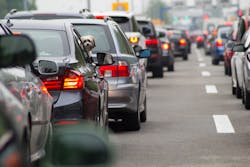Labor Day looks a lot different than the last federal holiday weekend.
In July, it looked like the United States was declaring its independence against the pandemic. For many, it was the first feeling of returning to normalcy in over a year. People were gathering with friends and family, whom they may not have seen for months, and many municipalities resumed firework displays.
The Centers for Disease Control and Prevention (CDC) no longer recommended vaccinated people to wear masks indoors, and the nation was nearing 70% of Americans age 18 and up having at least one dose of the COVID-19 vaccines.
Fast forward a few months, and it’s a completely different landscape, in part because of the delta variant. The nation is now in its fourth wave of COVID-19. Cases, hospitalizations and deaths are all up; they’re at their highest levels since the winter surge. There are shortages of necessary supplies and health care workers. The South, which has seen the lion's share of cases of late, also bore the brunt of Hurricane Ida, though heavy rains and flooding have traveled to the Northeast this week as well.
A federal mask mandate requires travelers on airplanes and public transportation mask up, including while at airports. And in August, the CDC once again recommended all people wear masks in areas with high community transmission. As of Sept. 2, all 50 states and two territories have high community transmission. The CDC and Department of State also have travel advisories tracking COVID-19 risk for international travel. CDC Director Dr. Rochelle P. Walensky acknowledged the difficulties of balancing risk, safety and responsibility with end-of-summer fun.
“We have actually articulated that people who are fully vaccinated and who are wearing masks can travel,” she said in a White House briefing on Tuesday. “Although given where we are with disease transmission right now, we would say that people need to take these risks into their own consideration as they think about traveling. First and foremost, if you are unvaccinated, we would recommend not traveling.”
The surge in COVID-19 cases, largely among the unvaccinated, has resulted in more people rolling up their sleeves. The Food and Drug Administration’s decision to grant Pfizer-BioNtech full approval for their vaccine, which will be marketed as Comirnaty, has, as anticipated, prompted hundreds of businesses, organizations and schools to mandate vaccination. About 907,000 doses are being administered per day on average. Now, 62% of the total U.S. population (205.9 million people) have received at least one dose of a COVID-19 vaccine.
Still, many of the recently inoculated don’t yet have full vaccine protection, and children under age 12 aren’t yet eligible for vaccination as they return to the classroom. Plus, there’s a growing number of reports of fully vaccinated people getting COVID-19, also known as breakthrough infections.
This has created much uncertainty as the nation heads into the Labor Day weekend. AAA did not forecast holiday travel numbers, but location data company Arrivalist is predicting more than 42 million Americans will hit the road over the holiday, a 1% decrease compared to 2020 and a 10% decrease compared to 2019. The National Safety Council (NSC) estimates that more than 460 people may die on the roads this weekend, a 19% increase over 2020 estimates.
“During this late-summer season, Americans will be driving at an increased rate, so it’s important to make sure the vehicle you’re driving is as safe as possible,” said NSC’s Mark Chung, vice president of roadway practice, in a statement. “We encourage everyone to take two minutes this week to check their vehicles for recalls. You may not know if you and your loved ones are at risk until you check.”
More than 50 million vehicles have unrepaired safety recalls, many of which can pose serious risk to drivers or passengers. More than 13.5 million airbags in the U.S. are defective and in need of repair, according to the National Highway Traffic Safety Administration. Vehicle owners can check for open recall by visiting www.CheckToProtect.org and entering their license plate or 17-digit Vehicle Identification number.
The NSC also advises checking oil levels and tire pressure before getting behind the wheel. Once behind the wheel, the NSC recommends wearing a seat belt, driving the speed limit, limiting distractions and, of course, to not drive while impaired.
About the Author
Nicole Stempak
Nicole Stempak is managing editor of EHS Today and conference content manager of the Safety Leadership Conference.

